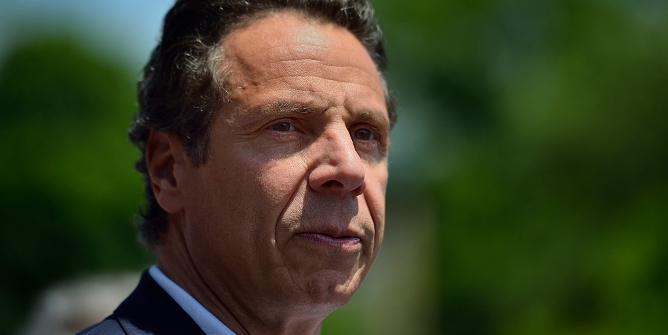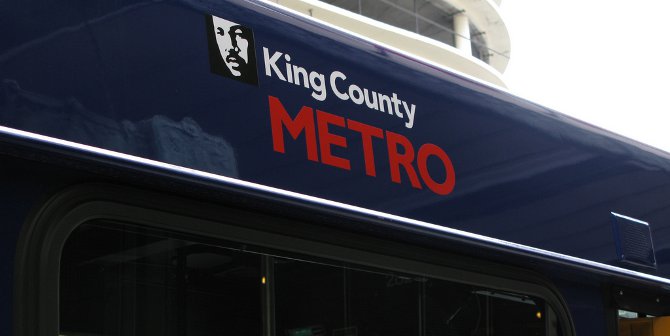 Since the end of July, New York Democratic Governor Andrew Cuomo has been embroiled in an unfolding political scandal over his disbanding of the Moreland Commission on political corruption that he set up last summer. Richard Brodsky looks at the background to ‘Morelandgate’, writing that Cuomo set up the Commission in response to allegations of corruption in the State Legislature, but had it shut down when it began to investigate corporate contributions to the Executive. He argues that the new investigation of New York’s federal prosecutor into the affair may help to bring to light the vast sums of money given legally, but unethically, to political campaigns in New York and across the U.S. by corporate interests.
Since the end of July, New York Democratic Governor Andrew Cuomo has been embroiled in an unfolding political scandal over his disbanding of the Moreland Commission on political corruption that he set up last summer. Richard Brodsky looks at the background to ‘Morelandgate’, writing that Cuomo set up the Commission in response to allegations of corruption in the State Legislature, but had it shut down when it began to investigate corporate contributions to the Executive. He argues that the new investigation of New York’s federal prosecutor into the affair may help to bring to light the vast sums of money given legally, but unethically, to political campaigns in New York and across the U.S. by corporate interests.
Political scandals, American or English, are always interesting. We’re prone to revel in the details and treat them as a form of free entertainment. A few are also important and allow the governed to understand how the political class wields power. But only a few. For every Profumo or Watergate there are dozens of Jeffery Archers or David Vitters, whose peccadilloes fade, and nothing changes. The current hoo-hah engulfing New York’s Governor Andrew Cuomo is certainly interesting. It remains to be seen whether it is important, or what it does to Cuomo’s considerable ambitions.
Consider recent events. Cuomo ran and won in 2010 as a crusading, get-it-done, get-out-of-my way Democrat. His liberal genealogy (Father Mario was the great liberal icon of the 1980s) didn’t amount to much. Economically he became an enthusiastic right-wing austerity bug, cutting estate, bank and income taxes for the wealthy, cutting government spending and bashing public sector unions. On social issues, he became an enthusiastic liberal aggressively pursuing gay marriage, gun control and abortion rights. A “progr-actionary”, if you will, laying a unique foundation for a national political bid.
His governing style made things happen. He pounded friend and enemy alike, and ruled by fear and threat. The practical results were tangible and popular. State budgets, perennially late, were uniformly on time. Republicans toed the line of the social issues, Democrats toed the line on economic issues. Re-election this year seemed assured, as a tough, I-make-things-happen executive.
And he raised a bijillion dollars. Actually over $30 million, more than all other American governors combined. Most of it came from the usual suspects in banking, finance, oil and gas, real estate with a nice sprinkling of labor union dollars. In political terms, he was riding high, wide and handsome. And then…

Part of his public persona was the stern anti-corruption crusader. And that Andrew Cuomo went straight at the State Legislature, which had been bedeviled by a series of indictments for garden-variety pocketing of public dollars and private bribes. Very popular with the voters, and editorial boards and good government groups.
He decided to convene a special Commission under a state law enacted in 1907, a Moreland Commission. Here’s where it started to break down. Moreland Commissions are limited by law to investigating the Executive Branch. To get at the Legislature he used a second statute, which “referred” the issue of corruption to the independently elected Attorney-General (AG). This was the legal gimmick that suited the political agenda, and it seemed to work. The hybrid Moreland/AG Commission dutifully began to subpoena (at Cuomo’s personal suggestion) the outside employment records, the travel reimbursement records, and the campaign contribution records of legislators.
Well, it turned out that the legislative campaign contribution problems were small potatoes compared with the amounts the big boys were giving to…..Andrew Cuomo. And some of the big boys were indiscreet enough to admit that their giving was having the results they wanted. Real estate interests, in a spasm of candor, spilled the beans. Discussing their campaign contributions they said “past efforts to maintain a personal and supportive relationship was critical in shaping the outcome” of legislation. “Our future ability to adopt favorable legislation, stop terrible legislation or modify legislation to limit the pain to our industry is directly tied to our continued positive relationship.”
This was not the investigation of legislative wrongdoing Cuomo had planned. He and his staff hit the roof. A series of subpoenas were about to be issued to the real estate and other corporate interests who had been funding the Cuomo operation. Cuomo told the Commission to back off. It did. That became public, and the Commission was widely tut-tutted into continuing its unwelcome inquiries. Long story short, Cuomo abruptly announced that, in exchange for minor changes in state law, he was disbanding the Moreland Commission.
The New York Times then published a long investigative article detailing the continued Cuomo interference with the Moreland/AG investigation and the machinations leading to its decapitation. The stuff hit the fan, in New York and nationally. Editorials, more newspaper stories, and cross accusations came relentlessly and often.
All this caught the attention of the Federal prosecutor for New York, Preet Bharara, who commenced an investigation of Cuomo and his staff. Finally, in a heavy-handed attempt to kill the story and investigation, Cuomo prodded a few of the more malleable Moreland Commissioners into announcing that there was no reason to suspect him of anything, he had been a perfect gentleman. Bharara liked this not one bit and sent a scathing public letter suggesting Cuomo had been tampering with witnesses.
And that’s where we stand today. Two parallel dynamics, political and legal, are keeping the scandal before the public eye. Politically, Cuomo’s right-wing Republican opponent, Rob Astorino, and his left-wing Democratic Primary opponent, Zephyr Teachout rail about obstruction of justice to uncertain voter effect. Legally, the Feds are proceeding, Cuomo and his staff have lawyered up, and something is likely to happen, probably before the November election.
On the legal front, Cuomo’s notable error was the “referral” to the AG. Whatever control he could assert over a Moreland Commission, he’ll have a tough time persuading anyone that he has the legal right to interfere with the AG’s investigation, once he made the official “referral”. That kind of legal mistake is somewhat atypical of Cuomo, but it opened the door to a lot of unpleasant questions and an “October Surprise” that could shift the politics of his re-election.
The bigger, unanswered question is what the public will make of the scandal. Cuomo will take a hit on temperament and character issues. But will voters make the connections that turns Morelandgate into an inflection point, moving from entertainment into a vehicle for change?
Cuomo had cynically calculated that by investigating a few idiot lawbreakers in the Legislature he could increase his political power, while still benefiting from the corrupt fundraising practices that are, unfortunately, perfectly legal. The huge sums from big, rich special interests trying to buy the policies that would keep them big and rich were to be ignored. “Pay no attention to the man behind the screen” was the theory.
Well, here’s where it could get interesting. Voters may begin to realize that the real corruption in New York and America is the raising of huge sums in political donations, all perfectly legal. If Cuomo’s campaign millions are connected to his pro-corporate policies on tax cuts for the wealthy, fracking, spending cuts, rent laws, and other stuff, then the merely interesting morphs into the genuinely important.
Political change doesn’t come in a smooth curve. Particular events drive a swift reversal in public opinion, seemingly out of the blue. And Morelandgate has the real potential to do just that.
More needs to happen. The results of the Federal investigation are crucial. So are the political abilities of Cuomo’s challengers. And so are the nationwide debates about how the American (and European) political systems are being reconstructed by unfettered political giving by corporations and the super-rich.
The Presidential elections of 2016 are shaping up. Cuomo is likely not to be a candidate, if only because he’s blocked by Hillary Clinton. But progressives are casting the election as a choice between rich, Republican corporate interests seeking to gain control of the government, and Democrats seeking to diminish income inequality and the political power of disembodied corporations. If Moreland drags Cuomo into that kind of debate, all his “progr-actionary” maneuvers and massive fundraising will be a drag on his ambitions, and those of any like-minded Democrat who want to be President.
And that would be interesting. And important.
Please read our comments policy before commenting.
Note: This article gives the views of the author, and not the position of USApp– American Politics and Policy, nor of the London School of Economics.
Shortened URL for this post: http://bit.ly/1pW4BQl
_________________________________
 Richard Brodsky – Demos & NYU Wagner
Richard Brodsky – Demos & NYU Wagner
Richard Brodsky served 14 terms as a New York State Assemblyman, retiring in 2010. He is currently a Senior Fellow at Demos, a progressive think tank in New York City, and a Senior Fellow at New York University’s Wagner School of Public Administration. His years of public service focused on government reform, environmental protection and economic policy. He is also a lawyer and a journalist.





